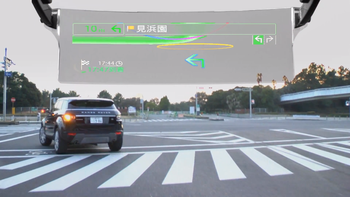Japan's Pioneer has launched a car navigation system that uses heads-up displays and virtual reality to guide drivers.

Pioneer's new car navigation system includes a heads up display that mounts on the ceiling and uses a laser to project images that appear to hover over the road.
The system, which comes in various configurations and is priced at $3,400 for a full setup, is part of the company's Cyber Navi line. A small screen is swapped for a car's sun visor to become the heads-up display, with a laser projecting driving instructions and maps that appear to float above the road about three meters away.
A camera mounted near the rear view mirror constantly scans the road ahead and feeds video to a traditional LCD screen mounted on the dashboard. The system overlays the video with graphics, using object recognition to detect and highlight the nearest vehicle ahead as well as upcoming street signs and traffic stops. The dashboard screen also points out landmarks such as restaurants and gas stations, highlighting buildings or adding large icons that float in the air.
Pioneer will also store still images snapped by the cameras as they pass through preset locations throughout the country. These can then be viewed by other drivers using the same system to check real-time traffic and road conditions. The preset locations will include notoriously crowded intersections, popular driving spots, and highway on-ramps and more will be added on an ad hoc basis to cover traffic jams and other occurrences.
Like other Japanese manufacturers, Pioneer is struggling to recover from big losses last year. The company has partnered with the country's largest mobile operator, NTT DoCoMo, to provide network and cloud services to its car navigation systems, as well as financial investment.
Car navigation systems are currently installed in about 40% of Japanese cars, and Pioneer is among the country's largest manufacturers. But it is struggling to compete with a surge in drivers that opt to use their GPS-equipped smartphones for navigation instead.
Pioneer does offer navigation systems that provide a touchscreen but rely on the network and processing power provided by smartphones. However, they are far less profitable for the company -- a typical version costs around just 15% of the latest Cyber Navi system.





